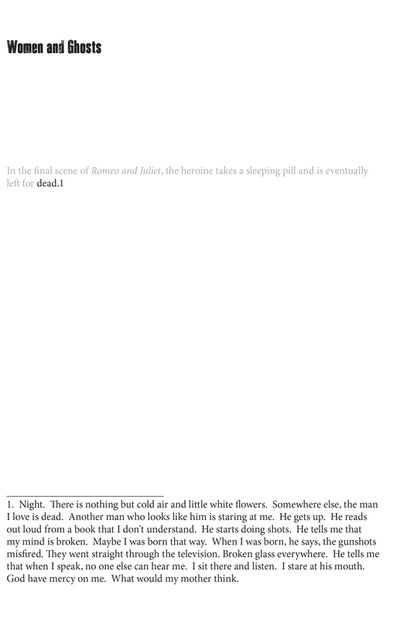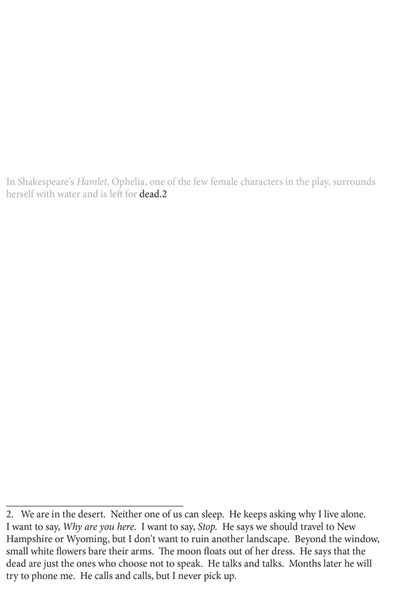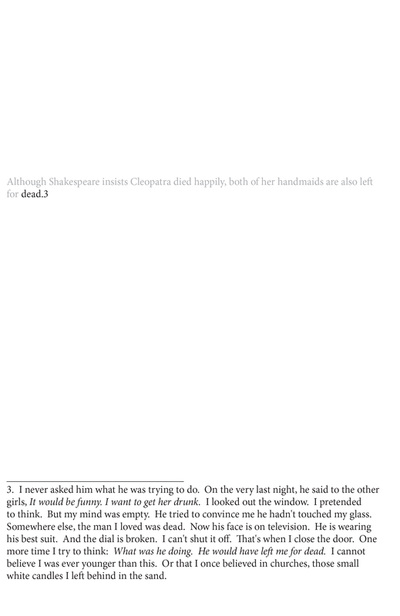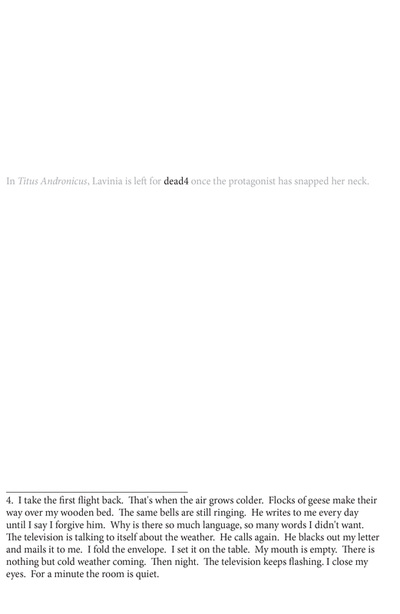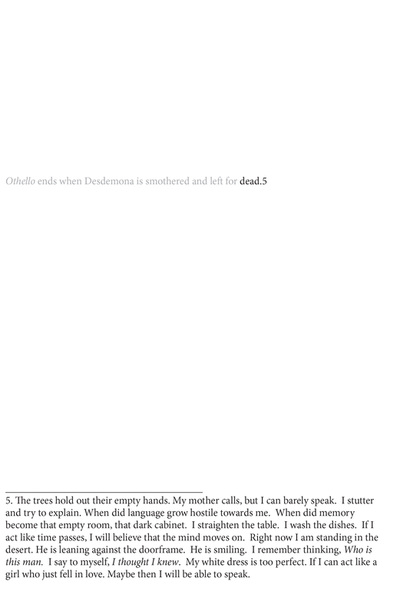- Home
- About
- Submit
- Features
- Interviews
- Book Reviews
- Previous Issues
- Blog
- Contact
-
Issue #25 Spring 2023
- Issue #25 Art Spring 2023 >
-
Issue #25 Poetry Spring 2023
>
- Emma Bolden Spring 2023
- Ronda Piszk Broatch Spring 2023
- M. Cynthia Cheung Spring 2023
- Flower Conroy Spring 2023
- Jill Crammond Spring 2023
- Sandra Crouch Spring 2023
- Satya Dash Spring 2023
- Rita Feinstein Spring 2023
- Dan Fliegel Spring 2023
- Lisa Higgs Spring 2023
- Dennis Hinrichsen Spring 2023
- Mara Jebsen Spring 2023
- Abriana Jetté Spring 2023
- Letitia Jiju Spring 2023
- E.W.I. Johnson Spring 2023
- Ashley Kunsa Spring 2023
- Susanna Lang Spring 2023
- James Fujinami Moore Spring 2023
- Matthew Murrey Spring 2023
- Pablo Otavalo Spring 2023
- Heather Qin Spring 2023
- Wesley Sexton Spring 2023
- Ashish Singh Spring 2023
- Sara Sowers-Wills Spring 2023
- Sydney Vogl Spring 2023
- Elinor Ann Walker Spring 2023
- Andrew Wells Spring 2023
- Erin Wilson Spring 2023
- Marina Hope Wilson Spring 2023
- David Wojciechowski Spring 2023
- Jules Wood Spring 2023
- Ellen Zhang Spring 2023
- BJ Zhou Spring 2023
- Jane Zwart Spring 2023
- Issue #25 Fiction Spring 2023 >
- Issue #25 Nonfiction Spring 2023 >
-
Issue #26 Fall 2023
- Issue #26 Art Fall 2023 >
-
Issue #26 Poetry Fall 2023
>
- Fasasi Abdulrosheed Oladipupo Fall 2023
- Christopher Ankney Fall 2023
- Magdalena Arias Vásquez Fall 2023
- John Peter Beck Fall 2023
- Mihir Bellamkonda Fall 2023
- Benjamin Bellas Fall 2023
- Michael Carson Fall 2023
- Kevin Clark Fall 2023
- Aaron Coleman Fall 2023
- Mark DeCarteret Fall 2023
- Denise Duhamel Fall 2023
- Brandel France de Bravo Fall 2023
- Tina Gross Fall 2023
- Amorak Huey Fall 2023
- James Kimbrell Fall 2023
- Casey Knott Fall 2023
- Stephen Lackaye Fall 2023
- Cynthia Manick Fall 2023
- Savannah McClendon Fall 2023
- John Muellner Fall 2023
- Mollie O’Leary Fall 2023
- Joel Peckham Fall 2023
- Natalia Prusinska Fall 2023
- henry 7. reneau, jr. Fall 2023
- Esther Sadoff Fall 2023
- Hilary Sallick Fall 2023
- Kelly R. Samuels Fall 2023
- Issue #26 Fiction Fall 2023 >
-
Issue #27 Spring 2024
- Issue #27 Art Spring 2024 >
-
Issue #27 Poetry Spring 2024
>
- Terry Belew Spring 2024
- Dustin Brookshire & Diamond Forde Spring 2024 Spring 2024
- Dustin Brookshire & Caridad Moro-Gronlier Spring 2024 Spring 2024
- Charlie Coleman Spring 2024
- Isabelle Doyle Spring 2024
- Reyzl Grace Spring 2024
- Kelly Gray Spring 2024
- Meredith Herndon Spring 2024
- Mina Khan Spring 2024
- Anoushka Kumar Spring 2024
- Cate Latimer Spring 2024
- BEE LB Spring 2024
- Grace Marie Liu Spring 2024
- Sarah Mills Spring 2024
- Faisal Mohyuddin 2024
- Marcus Myers Spring 2024
- Mike Puican Spring 2024
- Sarah Sorensen Spring 2024
- Lynne Thompson Spring 2024
- Natalie Tombasco Spring 2024
- Alexandra van de Kamp Spring 2024
- Donna Vorreyer Spring 2024
- Fiction #27 Spring 2024 >
- Nonfiction #27 Spring 2024 >
Kristina Marie Darling
Women and Ghosts
Dark Windows Will Come Early
There is too much beauty in the world. That morning, I stared out at endless mountains, thinking that the landscape would never look the way I felt as I moved through it.
I had traveled one thousand and thirty two miles to see a man I barely knew. We met briefly the year before in a small, eastern city known for its horses.
When I saw him again, nothing glittered or swooned. Something was off with the weight of his mouth. I wanted to say this, but I could barely speak.
*
Count your grey hairs
Count your chigger bites
Count your pills…
When one speaks, how does one begin? Most would say arithmetic is the simplest place to start. One window, two cracked plates, an empty glass. It is indeed virtuous to claim objectivity. No one wants to be misled by rhetoric, or worse, affect.
The young woman shouting in the corridor is promptly escorted out by security. The mathematician parts his lips. He clears his throat to speak.
*
When I snap my fingers
You will wake in a dear yet unfamiliar place
You will scarcely remember your travail…
When he told me I was lonely, I tried to forget.
He would remind me of the weather: You must feel terribly alone.
One night he told me about himself: I imagine you must feel different from the people who aren’t lonely.
I felt my bones crack open, but I couldn’t see the light coming through.
*
Some nights I sleep with my dress on. My teeth
are small and even…
I suggest all courage is artificial
Her sister did not fail
Noses amuse us and hers not less so
Short fair smart
utterly unsure of herself
Most of us find a way to speak eventually.
The same young woman is shouting again in the same corridor. Her hair covers her eyes. The guards twist her statements into questions: You wouldn’t what. What is the name of the gentleman. What are you doing.
But where does this courage come from?
In poetry, one doesn’t speak, but rather, one is spoken through. Homer’s The Odyssey begins with an invocation to the muses. He is merely their instrument, an opening through which the white thread is unspooled.
Jack Spicer didn’t believe in muses, but he did believe in martians. His poems were radio transmissions from other worlds, incessantly crackling in languages and voices other than his own.
C.D. Wright offered herself as a conduit, allowing those who are voiceless speak through her.
In Tribute to Freud, H.D. writes that it is the unconscious mind that speaks through the poet. Memory is a locked box, and poetry the little silver key.
*
Night. The same pristine field. I want to use language so badly, but I don’t know how.
*
I was old enough
to know love is blind as the old woman
pulled down the hall by her dog.
Their guns leaned against the wall
but men in those days kept themselves armed
in the dark and rain.
I thought of a burning bush.
And so the domestic objects, debris, and violence of the world around us crystallize in the mind. They are distilled into a single image, which goes up in flames.
So what are we left with?
*
It was a definite rupture in the zone in which they interpreted with decreasing frequency…
I look down at my feet. All that’s left is an old radio, a broken shot glass. The walk upstairs begins slowly. The smallest step is always the one covered in ice.
*
Violence doesn’t always involve the physical body.
He would look out at the water, watching the rain fall. He always held his phone as though it were a small child.
This is the only reason I travel, he said. To have an affair.
I had left the room to change into a bathing suit. But what does it mean to be present.
I felt a numbness in my fingertips, and when I placed my hand in his, the warmth was gone.
*
a bed is left open to a mirror
a mirror gazes long and hard at a bed
light fingers the house with its own acoustics
one of them writes this down
one has paper
Violence doesn’t always involve the physical body. He told me I was alone because I was lonely. Stop it, he said, and you’ll meet someone else.
I pretended I didn’t know about his wife.
*
How many times did I cross a threshold?
One morning the rain wouldn’t stop. The mail came later than it usually did. He had sent back the poem I wrote for him in a white envelope.
When I unfolded it, I saw what he had written. My words buried beneath his. He had told me that I was no longer, and never had been _____________.
*
To be loved is remarkable and rare. To be voiceless is fairly commonplace.
*
When violence does involve the physical body, it is often in the naming of it.
For weeks I chose silence, not wanting to harm what seemed like a delicate man. I stood in the garden, watching lilies open their perfect mouths.
Darling…
I didn’t mean…
I believe you are misunderstanding me…
There is too much beauty in the world.
So I begin gathering my things to go. My white dress a hothouse flower fading in the tremendous heat.
*
How does one re-enter language?
In Black Sun, Julia Kristeva describes mourning as a loss of language. Words no longer correspond to things in the world: a coffee cup, a broken latch, a small printed receipt from the airline ticket counter.
We reenter language by taking it apart. By dismantling it, piece by piece.
When we see the bones crack open, we also the light coming through.
*
How many threads have I broken with my teeth. How many times
have I looked at the stars and felt ill…
Throughout Steal Away, C.D. Wright inhabits the voices of others, even those we might deem glaringly insignificant.
It is through the juxtaposition of voices, texts, and types of language that she creates friction.
I had always wondered what the simple act of striking sparks could do. For instance, can the light be caught in a jar. Could it be made to power a blow-dryer. Will the sparks ever be visible outside this body, these rooms.
Heat has been known to generate fires. For C.D. Wright, it is the spark of one voice against another that allows her words to shine through more clearly.
Voices often exist in contrast with one another. It is for this reason that the jeweler places the diamond against black velvet. He takes his measurements and leaves in silence.
In the deserts of New Mexico, heat abounds, and so does fire. I place the dead flowers on the pile of brush. I open my mouth to speak.
--
Kristina Marie Darling is the author of over twenty collections of poetry and hybrid prose, which include VOW and SCORCHED ALTAR: SELECTED POEMS & STORIES 2007-2014. Her awards include fellowships from Yaddo, the Ucross Foundation, and the Helene Wurlitzer Foundation, as well as grants from the Kittredge Fund, the Elizabeth George Foundation, and the Rockefeller Foundation Archive Center. She was recently selected as a Visiting Artist at the American Academy in Rome.
I had traveled one thousand and thirty two miles to see a man I barely knew. We met briefly the year before in a small, eastern city known for its horses.
When I saw him again, nothing glittered or swooned. Something was off with the weight of his mouth. I wanted to say this, but I could barely speak.
*
Count your grey hairs
Count your chigger bites
Count your pills…
When one speaks, how does one begin? Most would say arithmetic is the simplest place to start. One window, two cracked plates, an empty glass. It is indeed virtuous to claim objectivity. No one wants to be misled by rhetoric, or worse, affect.
The young woman shouting in the corridor is promptly escorted out by security. The mathematician parts his lips. He clears his throat to speak.
*
When I snap my fingers
You will wake in a dear yet unfamiliar place
You will scarcely remember your travail…
When he told me I was lonely, I tried to forget.
He would remind me of the weather: You must feel terribly alone.
One night he told me about himself: I imagine you must feel different from the people who aren’t lonely.
I felt my bones crack open, but I couldn’t see the light coming through.
*
Some nights I sleep with my dress on. My teeth
are small and even…
I suggest all courage is artificial
Her sister did not fail
Noses amuse us and hers not less so
Short fair smart
utterly unsure of herself
Most of us find a way to speak eventually.
The same young woman is shouting again in the same corridor. Her hair covers her eyes. The guards twist her statements into questions: You wouldn’t what. What is the name of the gentleman. What are you doing.
But where does this courage come from?
In poetry, one doesn’t speak, but rather, one is spoken through. Homer’s The Odyssey begins with an invocation to the muses. He is merely their instrument, an opening through which the white thread is unspooled.
Jack Spicer didn’t believe in muses, but he did believe in martians. His poems were radio transmissions from other worlds, incessantly crackling in languages and voices other than his own.
C.D. Wright offered herself as a conduit, allowing those who are voiceless speak through her.
In Tribute to Freud, H.D. writes that it is the unconscious mind that speaks through the poet. Memory is a locked box, and poetry the little silver key.
*
Night. The same pristine field. I want to use language so badly, but I don’t know how.
*
I was old enough
to know love is blind as the old woman
pulled down the hall by her dog.
Their guns leaned against the wall
but men in those days kept themselves armed
in the dark and rain.
I thought of a burning bush.
And so the domestic objects, debris, and violence of the world around us crystallize in the mind. They are distilled into a single image, which goes up in flames.
So what are we left with?
*
It was a definite rupture in the zone in which they interpreted with decreasing frequency…
I look down at my feet. All that’s left is an old radio, a broken shot glass. The walk upstairs begins slowly. The smallest step is always the one covered in ice.
*
Violence doesn’t always involve the physical body.
He would look out at the water, watching the rain fall. He always held his phone as though it were a small child.
This is the only reason I travel, he said. To have an affair.
I had left the room to change into a bathing suit. But what does it mean to be present.
I felt a numbness in my fingertips, and when I placed my hand in his, the warmth was gone.
*
a bed is left open to a mirror
a mirror gazes long and hard at a bed
light fingers the house with its own acoustics
one of them writes this down
one has paper
Violence doesn’t always involve the physical body. He told me I was alone because I was lonely. Stop it, he said, and you’ll meet someone else.
I pretended I didn’t know about his wife.
*
How many times did I cross a threshold?
One morning the rain wouldn’t stop. The mail came later than it usually did. He had sent back the poem I wrote for him in a white envelope.
When I unfolded it, I saw what he had written. My words buried beneath his. He had told me that I was no longer, and never had been _____________.
*
To be loved is remarkable and rare. To be voiceless is fairly commonplace.
*
When violence does involve the physical body, it is often in the naming of it.
For weeks I chose silence, not wanting to harm what seemed like a delicate man. I stood in the garden, watching lilies open their perfect mouths.
Darling…
I didn’t mean…
I believe you are misunderstanding me…
There is too much beauty in the world.
So I begin gathering my things to go. My white dress a hothouse flower fading in the tremendous heat.
*
How does one re-enter language?
In Black Sun, Julia Kristeva describes mourning as a loss of language. Words no longer correspond to things in the world: a coffee cup, a broken latch, a small printed receipt from the airline ticket counter.
We reenter language by taking it apart. By dismantling it, piece by piece.
When we see the bones crack open, we also the light coming through.
*
How many threads have I broken with my teeth. How many times
have I looked at the stars and felt ill…
Throughout Steal Away, C.D. Wright inhabits the voices of others, even those we might deem glaringly insignificant.
It is through the juxtaposition of voices, texts, and types of language that she creates friction.
I had always wondered what the simple act of striking sparks could do. For instance, can the light be caught in a jar. Could it be made to power a blow-dryer. Will the sparks ever be visible outside this body, these rooms.
Heat has been known to generate fires. For C.D. Wright, it is the spark of one voice against another that allows her words to shine through more clearly.
Voices often exist in contrast with one another. It is for this reason that the jeweler places the diamond against black velvet. He takes his measurements and leaves in silence.
In the deserts of New Mexico, heat abounds, and so does fire. I place the dead flowers on the pile of brush. I open my mouth to speak.
--
Kristina Marie Darling is the author of over twenty collections of poetry and hybrid prose, which include VOW and SCORCHED ALTAR: SELECTED POEMS & STORIES 2007-2014. Her awards include fellowships from Yaddo, the Ucross Foundation, and the Helene Wurlitzer Foundation, as well as grants from the Kittredge Fund, the Elizabeth George Foundation, and the Rockefeller Foundation Archive Center. She was recently selected as a Visiting Artist at the American Academy in Rome.
- Home
- About
- Submit
- Features
- Interviews
- Book Reviews
- Previous Issues
- Blog
- Contact
-
Issue #25 Spring 2023
- Issue #25 Art Spring 2023 >
-
Issue #25 Poetry Spring 2023
>
- Emma Bolden Spring 2023
- Ronda Piszk Broatch Spring 2023
- M. Cynthia Cheung Spring 2023
- Flower Conroy Spring 2023
- Jill Crammond Spring 2023
- Sandra Crouch Spring 2023
- Satya Dash Spring 2023
- Rita Feinstein Spring 2023
- Dan Fliegel Spring 2023
- Lisa Higgs Spring 2023
- Dennis Hinrichsen Spring 2023
- Mara Jebsen Spring 2023
- Abriana Jetté Spring 2023
- Letitia Jiju Spring 2023
- E.W.I. Johnson Spring 2023
- Ashley Kunsa Spring 2023
- Susanna Lang Spring 2023
- James Fujinami Moore Spring 2023
- Matthew Murrey Spring 2023
- Pablo Otavalo Spring 2023
- Heather Qin Spring 2023
- Wesley Sexton Spring 2023
- Ashish Singh Spring 2023
- Sara Sowers-Wills Spring 2023
- Sydney Vogl Spring 2023
- Elinor Ann Walker Spring 2023
- Andrew Wells Spring 2023
- Erin Wilson Spring 2023
- Marina Hope Wilson Spring 2023
- David Wojciechowski Spring 2023
- Jules Wood Spring 2023
- Ellen Zhang Spring 2023
- BJ Zhou Spring 2023
- Jane Zwart Spring 2023
- Issue #25 Fiction Spring 2023 >
- Issue #25 Nonfiction Spring 2023 >
-
Issue #26 Fall 2023
- Issue #26 Art Fall 2023 >
-
Issue #26 Poetry Fall 2023
>
- Fasasi Abdulrosheed Oladipupo Fall 2023
- Christopher Ankney Fall 2023
- Magdalena Arias Vásquez Fall 2023
- John Peter Beck Fall 2023
- Mihir Bellamkonda Fall 2023
- Benjamin Bellas Fall 2023
- Michael Carson Fall 2023
- Kevin Clark Fall 2023
- Aaron Coleman Fall 2023
- Mark DeCarteret Fall 2023
- Denise Duhamel Fall 2023
- Brandel France de Bravo Fall 2023
- Tina Gross Fall 2023
- Amorak Huey Fall 2023
- James Kimbrell Fall 2023
- Casey Knott Fall 2023
- Stephen Lackaye Fall 2023
- Cynthia Manick Fall 2023
- Savannah McClendon Fall 2023
- John Muellner Fall 2023
- Mollie O’Leary Fall 2023
- Joel Peckham Fall 2023
- Natalia Prusinska Fall 2023
- henry 7. reneau, jr. Fall 2023
- Esther Sadoff Fall 2023
- Hilary Sallick Fall 2023
- Kelly R. Samuels Fall 2023
- Issue #26 Fiction Fall 2023 >
-
Issue #27 Spring 2024
- Issue #27 Art Spring 2024 >
-
Issue #27 Poetry Spring 2024
>
- Terry Belew Spring 2024
- Dustin Brookshire & Diamond Forde Spring 2024 Spring 2024
- Dustin Brookshire & Caridad Moro-Gronlier Spring 2024 Spring 2024
- Charlie Coleman Spring 2024
- Isabelle Doyle Spring 2024
- Reyzl Grace Spring 2024
- Kelly Gray Spring 2024
- Meredith Herndon Spring 2024
- Mina Khan Spring 2024
- Anoushka Kumar Spring 2024
- Cate Latimer Spring 2024
- BEE LB Spring 2024
- Grace Marie Liu Spring 2024
- Sarah Mills Spring 2024
- Faisal Mohyuddin 2024
- Marcus Myers Spring 2024
- Mike Puican Spring 2024
- Sarah Sorensen Spring 2024
- Lynne Thompson Spring 2024
- Natalie Tombasco Spring 2024
- Alexandra van de Kamp Spring 2024
- Donna Vorreyer Spring 2024
- Fiction #27 Spring 2024 >
- Nonfiction #27 Spring 2024 >

